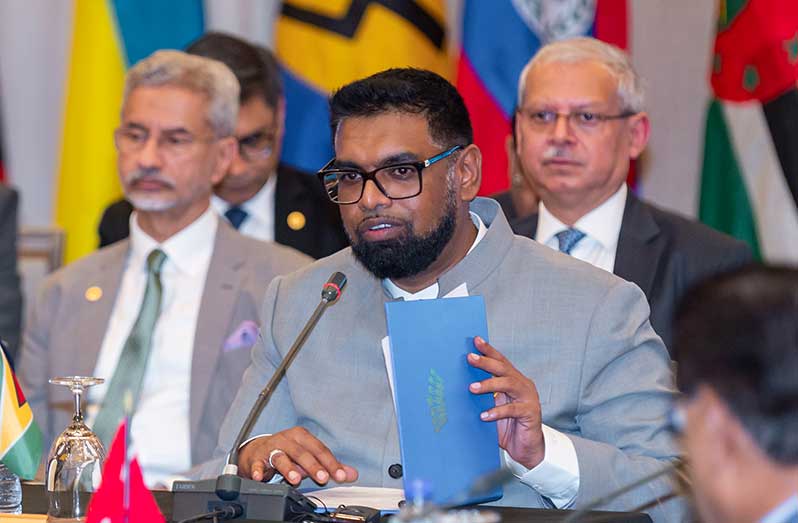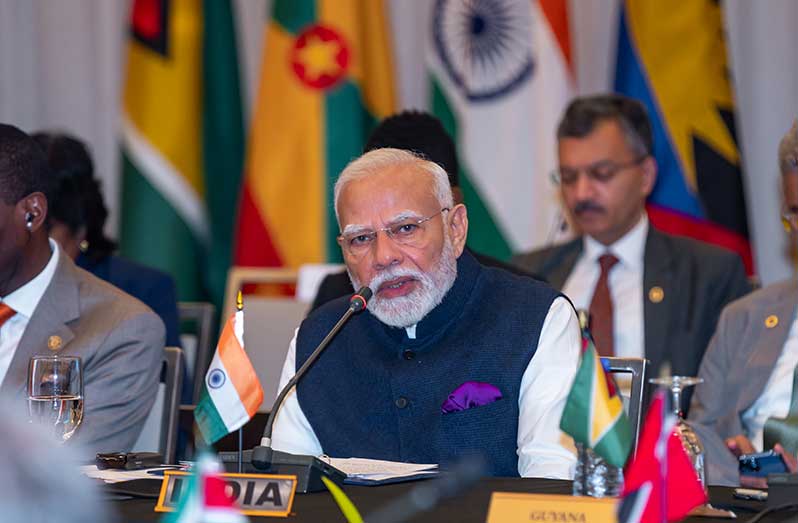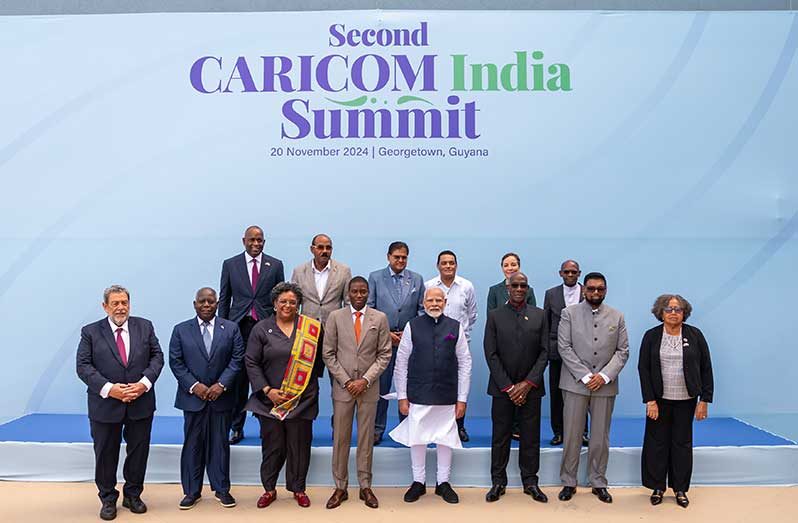– PM Modi says,
– expansion of scholarships, provision of ferries among proposed areas of collaboration
By Shamar Meusa and Naomi Parris
EAGER to deepen diplomatic and economic ties with the Caribbean Community, India, the world’s largest democracy, is ready and willing to share its expertise and experience in areas such as agriculture and technology development
This is according to Prime Minister of India, Shri Narendra Modi, who made this disclosure as he addressed the Second CARICOM-India summit which was held at the Guyana Marriott Hotel, coinciding with his three-day state visit to Guyana.
During his address, the PM outlined several areas in which his country, one of the world’s fastest-growing economies, can aid the Caribbean.
The most significant of these proposals Modi made is co-operation in the ocean economy and maritime security.

The Prime Minister said that in order to enhance connectivity in the region, he proposed that India would supply passenger and cargo ferries to the region to aid intra-regional connectivity. Together, he said India and the region can also work on maritime zoning.
Promoting further regional connectivity has been one move that CARICOM has been working on for quite some time with studies to explore options for maritime services between several countries brought up.
As the region moves towards its goals of achieving food security, Modi noted that another pillar of co-operation is agriculture and food security.
With technology such as drones, digital-farming mechanisation and soil testing, the Prime Minister noted that India is transforming its agricultural sector and has even placed focus on nano fertilisers and natural foods.
To improve food security, he added that India is promoting millets which are considered a super food that can grow in any kind of climate.
Against this backdrop, he posited that this can become an effective means of addressing climate change and food security for the CARICOM region.
Additionally, he said that while sargassum (seaweed) is a big problem in the region that affects the hotel and tourism industry, India has developed technology to make fertiliser with seaweed.
He expressed, “This technology cannot only help you to solve this problem, but can also increase crop yield. India is ready to share all these experiences with CARICOM countries.”
Prime Minister Modi added that the Caribbean community and India have already established relations regarding capacity building through scholarships and training.
Against this backdrop, he proposed an additional 1,000 slots for ITEC (Indian Technical and Economic Co-operation) scholarships given by India over the next five years.
Further to this, Modi said that in order to promote technical and skill development of youth, they have set up a technical development centre in Belize and will expand its scale and size to be further utilised by all CARICOM countries.
Additionally, he revealed that they will also work on creating a forensic centre for the CARICOM region for continuous capacity building.
He also added that as the ‘mother of democracy’, India remains ready to work with CARICOM countries on training for parliamentarians.
Moving to another pillar of possible co-operation, the Prime Minister highlighted renewable energy and climate change, as he noted that environment-related challenges are a priority for all.
In this regard, to increase global coordination, he said India started several initiatives, those being the International Solar Alliance, The Coalition for Disaster Resilient Infrastructure and the Global Fuel Alliance, among others.
While he expressed pleasure that CARICOM has joined the International Solar Alliance, he invited all member states to join the other initiatives as well.
With this, Modi said that they are investing in a big way in areas of renewable energy and to this end, propose that India can help in making at least one government building solar powered in each of the CARICOM countries.
Recognising India’s status as a global technology and startup hub, characterised by the enduring success of its developed solutions, he proposed collaborative efforts between India and the CARICOM region to adopt the Unified Payment Interface (UPI) across all CARICOM nations.
He said the UPI has aided India in its direct-benefit transfers to millions of citizens with just one click. The Prime Minister added that countries such as the UAE, Singapore, France and Sri Lanka are connected to the UPI.
Additionally, in the healthcare sphere, Modi told the gathering of Caribbean leaders that health security has been a high-priority area for India.
In this area in India, he said that they have been working continuously to make quality and affordable healthcare available to citizens and for this have opened several centres providing generic medicine.
To this end, he proposed that similar centres be opened around CARICOM, providing generic medicines if agreements can be concluded to recognise Indian pharmacopoeia between India and all countries. This effort can be accelerated.
In health co-operation, Modi proposed several other innovations that have been pushed along by India to aid in this region.
DEEPER INTEGRATION, CO-OPERATIVE ACTION
Meanwhile, CARICOM Chairman and Grenada’s Prime Minister Dickon Mitchell highlighted the region’s shared history, common values, kinship and strong friendship with India.
He reminded of India’s strong influence, citing the Caribbean’s enriched, diverse and vibrant culture.
“We commend India’s unwavering commitment to the sustainable development of our region, especially in this intricate and interconnected era of globalisation, it is evident to us that the challenges we face can only be effectively addressed through a spirit of deeper integration and co-operation and co-operative action amongst nations.”

According to the Grenadian leader, India’s enhanced engagement in recent years demonstrates a genuine eagerness to fortify bilateral ties and collaboratively confront pressing issues.
“Our collaboration spans various sectors, including trade, technology, healthcare, education and climate resilience, each contributing to the sustainable development and prosperity of our regions,” he said.
Prime Minister Mitchell believes the summit now presents an important and timely opportunity for leaders to have frank discussion to further mutual benefits.
Harnessing India’s expertise in areas such as agriculture, energy, health, human resource development and information and communications technology, CARICOM is optimistic that bilaterial co-operation will be expanded.
“Looking forward, we envision a future where CARICOM- India relations continue to flourish and expand.”
Further recognising India for its continued support to the region, Guyana’s President, Dr Irfaan Ali expressed hope that the CARICOM-India summit will lead to impactful decisions for the region, emphasising the shared resilience and determination for development and prosperity.
Dr Ali extended a heartfelt welcome to Prime Minister Modi, emphasising the historical and cultural bonds between India and the Caribbean.
According to Dr Ali, the momentous gathering extends far beyond just discussions; it signifies the deep historical cultural and diplomatic bonds that unite India and the wider Caribbean.
“The ties between India and the Caribbean are deeply rooted in shared history and enduring cultural connections. Guyana, as some other Caribbean nations, owes much of its rich cultural tapestry to the arrival of indentured immigrants from India who, over a century ago, crossed vast oceans to work on sugar plantations on the colonial rule.”
He reiterated that the historical ties between the two nations are complemented by a shared history of colonisation, which left indelible marks on both India and the Caribbean.
CARICOM Heads of Government and India’s Prime Minister last met in 2019 in the margins of the 74th Session of the United Nations General Assembly (UNGA), where they discussed co-operation modalities in renewable energy and climate change through a US$150 million credit line from India.
Although the member states of CARICOM have long been friends with India, the signing of the Agreement on Scientific and Technical Co-operation in 1985 marked the beginning of the formalisation of ties between the bloc and India.
It was in 2003 when the Hon K.D. Knight, the former Jamaican Minister of Foreign Affairs and Foreign Trade and later the Community Council Chairman, led a CARICOM delegation to India, they signed an agreement to create a Standing Joint Commission on Consultation, Co-operation, and Co-ordination between CARICOM and India.





.jpg)








